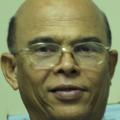Htwe, 38, from Bahan Township in Rangoon, reportedly died of a heart
disease.
Tin Tin Htwe, who was arrested during the 2007 Saffron
Revolution, died in Insein Prison hospital on 23 December, according to
Assistance Association for Political Prisoners in Burma (AAPP), a Thai-Burma
border based organization working for the rights of political prisoners in
Burma. Her residential quarter, located within a kilometre east of Shwedagon
Pagoda, offered a panoramic sight of the deadliest crackdown during the 2007
September Saffron Revolution when armed forces fired on the procession of
Buddhist monks.
In 2009, there have been three political prisoner deaths.
Salai Hla Moe, Saw Char Late and Tin Tin Htwe, died in prison without getting
proper medical health care. According AAPP's documentation, 143 political
prisoners, some of them law makers, writers and journalists have died in prison
since 1988.
Present sorrowful affairs in Burma re-confirm that the
military junta is making a determined march along the anti-democracy course. For
instance, the junta continues to detain and incarcerate more than 2,200
political prisoners. They include Nobel Peace Prize winner Aung San Suu Kyi who
has been confined to her residence for 14 of the last 20 years. Su Su Nway,
recipient of the 2006 Humphrey Freedom Award from the Canada-based group, Rights
and Democracy, is lodged in the notorious Insein Jail since November 2007. This
is her second jail stint since 2005.
Students such as Min Ko Naing, Ko Ko Gyi, Jimmy (aka) Kyaw Min Yu, Htay Kywe,
Hla Myo Naung, Mee Mee and Nilar Thein are sentenced to 65 years. Ethnic Shan
political leader Hkun Htun Oo and a prominent comedian Zarganar are also still
in prison despite medical complications.
In fact, there are many more
political prisoners who are seriously sick; they receive just rudimentary health
care. Most political detainees are intentionally transferred to remote prisons
where health-care is in a state of desolation. Most prisoners of conscience have
to face terrible torture as a matter of routine daily. The International
Committee of the Red Cross has been denied free access to prisons since December
2005.
Releasing prisoners of conscience may be a sign of sincerity that
the generals honestly want to restore democracy and human rights in Burma. But,
delay in release of political prisoners means the military rulers may not allow
democracy and national reconciliation.
Peoples from all walks of life are
severely suffering from a lot of miseries under the military regime which is in
the saddle for nearly five decades. The consequences of this reign of violence
produce spilling over effects directly into territories of the neighbouring
countries.
Over the past two decades, more than a million Burmese
workers have fled to Thailand. This has placed tremendous pressure on the Thai
governments which is facing its own hardships. Trans-border crime has gone up
with a massive influx of narcotics drugs, including heroin and methamphetamines.
Trafficking in women and children has increased along the 2,400 km-long
Thailand-Burma border. The regime's neglect of health-care has also produced a
new HIV/AIDS flow into neighbouring countries.
Within the country, the
living standards of average citizens are rapidly falling. The situation is
alarming even on the outskirts of Yangon. According to the UN estimation, one
child in three under the age of five is suffering from malnutrition.
Field studies by Dr Chris Beyrer (Johns Hopkins Bloomberg School of
Public Health) and his colleagues show that the junta has neglected the health
sector. "Burma's investment in the health infrastructure is one of the lowest
worldwide', the study carried out during 2005 and 2006 shows. The health sector
is steeped in corruption, the study says.
The World Health Organisation
(WHO) has ranked Burma one place above Sierra Leone, which came 191st in a list
of countries surveyed. Nearly three-fourth of the country lives below the
poverty line. A large slice of the country's budget, an estimated 40-50 percent
goes to fund a 400,000-strong armed force.
Health care gets just under
three percent of the outlay. A niggardly allocation of $137,000 per year is made
for treatment of 52 million people suffering from HIV/Aids. UNICEF reports that
spending on healthcare in Burma amounts to 40 cents per citizen per year,
compared to $61 in Thailand.
Signalling that defence will continue to
attract funding, Russia has signed a contract to deliver 20 MiG-29 planes to
Burma's air force. Kommersant - Russia's Daily Online reports that the
contract is worth nearly 400 million euros (570 million dollars). This is yet
another instance of Russia ignoring the sanctions on Burma. China is also
ignoring these sanctions. With such friends to defy the world opinion, the junta
is unlikely to the mounting pressure from human rights activists and people at
large. It will do its best to perpetuate the fraud it had inflicted in the name
of a referendum in 2008 on a constitution that is designed to keep the army in
power.
The elections scheduled for 2010 will legalize the military rule.
Just like the referendum held at gun-point, the forthcoming election will be
anything but free and fair. But the question is how long will the junta be able
to cling to power?
The socio-economic situation is worsening by the day.
Till date, the junta has failed to pay attention to the problem with all its
energies focussed on cementing its hold on the structures of governance.
National reconciliation is a mantra the Junta recites only when nudged by the
outside powers and not otherwise. The junta also does not show respect to the
successive resolutions adopted by the UN General Assembly (UNGA) calling for a
return of democratic system in Burma through a tripartite dialogue between the
Junta led by Senior General Than Shwe, democratic forces led by Aung San Suu Kyi
and representatives of ethnic nationalities.
(Note: You can view every article as one long page if you sign up as an Advocate Member, or higher).





